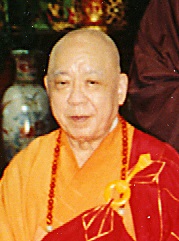Series: Wisdom of the Chan Masters

"All religions are the same" Chan master Jy Din told me in 1999 while visiting at Hsu Yun temple. What did he mean? When we examine religions, they all appear quite varied: different beliefs, customs, and ceremonies lead us to consider that they are, in fact, all not the same. So, what point of view might he have had to nonetheless consider them all the same? Clearly, he wasn't interested in outward appearances.
One obvious approach to interpreting his words is to consider them from the spiritual angle; that is, from a direction opaque to the rational mind, yet clear and bright to another kind of mind, one which experiences and understands through particular sorts of feelings. We might consider, for example, that whether we were to walk into a Mosque, a Cathedral, a Buddhist temple, or a Hindu mandir, we might experience similar types of feelings—maybe profound peace, joy, or contentment—regardless of our own personal religious identification. Could it be that it’s just this type of numinous feeling which gives rise to religion? That through the medium of religion, an abstract, non-rational, intuitive, feeling-based form of awareness and understanding can assert itself? Could it be that religion is, in essence, an expression of reification, a social construction which reveals something outside of conscious awareness and brings it into our physical world where we may come to better connect with it?
If this explanation is on track, how can we explain the vast differences in the appearance of religions around the world? I'm not sure we need to. If we can look at the foundation from which religions are built, and if we recognize that that foundation is universal and innate to our collective experience as humans, we can begin to see the sameness that Master Jy Din may have been alluding to: a unifying reality which embraces all - Chan's empty circle.
